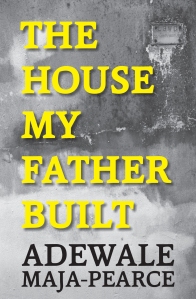
Back home, I felt shabby. How had I acted any differently from the tenants? Later that day, I went down to see Prince. He was standing on his balcony, rubbing his belly and eyeing the local talent as he nursed a huge reefer. I told him that I was thinking of leaving Pepsi and his family where they were. I didn’t tell him that the BQ wasn’t even mine. My father had given it to the younger of my two brothers in addition to his share in the main building and I was still smarting from the favouritism he had shown him. Prince considered me for a moment and then indicated that we should go inside. When we were seated, he said that I was making a mistake; that first I had to let Pepsi know who was boss by throwing him out. I could let him back in afterwards on new terms if I still felt the same way although he, personally, wouldn’t recommend it because a man who can call the police for you will do worse the next time. He was right, of course, and so, the next day, properly mobilized, off he went to bribe the High Court judge.
He was pleased
as Punch when he returned.
‘I first went to
greet Sunday and then I thought to check whether the judge was around. When I
got to the office the clerk asked me if I wanted to see him. Just like that.
The judge looked at the file and said, “Oh, you have a good lawyer. Yes, a good
lawyer.” He read through the papers and said, “Oh, this is a simple case, yes,
a simple case. Just tell your lawyer that it has no merit and should be struck
out. No merit. That’s all.” I thanked him and asked if I could buy bread for
his children. He laughed and told me to discuss it with his clerk, who demanded
for N5, 000.’ He paused and watched me,
waiting for the words to sink in. ‘Can you believe that?’ he continued. ‘Just N5, 000 for a whole High Court judge!’ He
paused again and shook his head. ‘Naija done spoil,’ he concluded and laughed,
not altogether disapprovingly.
And that was how
it happened. But my lawyer from the fire-on-the-mountain chambers almost goofed
even though Pepsi himself was absent at the hearing. Just before we entered the
courtroom Prince told him that everything was sorted and he should just say
blah blah blah, no problem. As he spoke, I noticed that my lawyer wasn’t paying
attention, as though to say, don’t teach me my work. When our case was finally
called he went into a long spiel citing this and that from all the books he had
lugged along. The clerk, realizing that he was in danger of derailing, leaned
over and whispered to the judge even as my lawyer prattled on. Finally, the
judge raised his hand and asked him whether, in essence, he wanted the case to be
struck out, whereupon my lawyer agreed and it was struck out. We immediately
notified Sunday. He was happy to see us. Another payday.
So it was all
over. Pepsi didn’t put up any resistance this time. Prince and I sat upstairs
drinking beer as we watched the proceedings. It was a melancholy, overcast sort
of day, always threatening to rain but never doing so and, for once, Prince
wore a singlet over his protruding belly. As with the Alhaji, Pepsi had taken
the precaution of stripping the place of every fixture and fitting, including
the wire that ran from his meter at the front of the main building all the way
to the BQ at the back. He must have done it when we were out, perhaps in
revenge for me cutting his light. Replacing it alone cost me N6, 000.
As before, when
Ngozi found herself similarly embarrassed, some of the neighbours offered space
for Pepsi and his wife to store their belongings. The widow even said she could
take in their daughter, but Pepsi’s wife declined. She was the one directing
Pepsi where to put what. He once ventured an opinion but she shouted him down,
‘I said pack the plates, pack the plates,’ as if she was talking to a small
boy, which scandalized Prince no end. One year later, I heard that Pepsi was
dead. It happened that he was waiting for a customer at Ojuelegba, the busy
intersection made famous by Fela from the time he lived there, when a runaway
bus ploughed into him. I also heard that his widow and children were living at
Akoka, just around the corner from the university. I thought of going to visit
them but didn’t and then it was too late. Besides, what would I have said?
© Adewale Maja-Pearce
Adewale
Maja-Pearce is the author of several books, including Loyalties
and Other Stories, In My Father's Country, How many miles to Babylon?, A
Mask Dancing, Who's Afraid of Wole Soyinka?, From Khaki to Agbada,
Remembering Ken Saro-Wiwa and Other Essays, A Peculiar Tragedy, and
Counting the Cost, as well as the 1998 and 1999 annual reports on human
rights violations in Nigeria. He also edited The Heinemann Book of African
Poetry in English, Wole Soyinka: An Appraisal, Christopher Okigbo:
Collected Poems, The New Gong Book of New Nigerian Short Stories,
and Other Stories, In My Father's Country, How many miles to Babylon?, A
Mask Dancing, Who's Afraid of Wole Soyinka?, From Khaki to Agbada,
Remembering Ken Saro-Wiwa and Other Essays, A Peculiar Tragedy, and
Counting the Cost, as well as the 1998 and 1999 annual reports on human
rights violations in Nigeria. He also edited The Heinemann Book of African
Poetry in English, Wole Soyinka: An Appraisal, Christopher Okigbo:
Collected Poems, The New Gong Book of New Nigerian Short Stories,
and Dream
Chasers.
Click here to see Maja-Pearce's amazon.com
page: http://www.amazon.com/Adewale-Maja-Pearce/e/B001HPKIOU
No comments:
Post a Comment